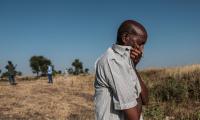Independent watchdog of human rights is emerging in Ethiopia

The partnership with the Ethiopian Human Rights Commission is funded by the Governments of Denmark, Germany, Norway and The Netherlands.
Until recently, many people questioned the independence of the Ethiopian Human Rights Commission. They accused it of being too closely linked to the government.
‘It was just a body that was justifying the brutality of government forces’, Executive Director of the Center for Advancement of Rights and Democracy, Befeqadu Z. Hailu claims.
Editor-in-chief of the newspaper, Ethiopia Insider, Tesfalem Waldyes, agrees: ‘Even when they [the Ethiopian Human Rights Commission] investigated the abuses, they blamed the protesters or the victims, rather than the government forces’.
Calling out cases of human rights violations
In recent years, however, the Ethiopian government’s political reforms have paved the way for concrete steps towards improving the protection of human rights. This includes an amendment to the founding law of the Commission to ensure its independence. An analysis of the founding law, carried out by the Institute as part of a capacity assessment of the Commission, helped the Commission advocate for the amendment.
As a result of the independence gained from this, the Commission now regularly carries out investigations and publishes reports on serious human rights violations that are taking place as Ethiopia grapples with ethnic and political unrest.
After investigating the unrest and killings that followed the assassination of the musician Hachalu Hundessa in June 2020, the Commission published a report that documented abuses at the hands of security forces. According to the investigation, at least 76 people were killed by security forces, whose excessive force also left 190 injured.
Independently appointed commissioners
Another result of the amendment of the founding law of the Commission is that the appointment of commissioners is now based on merit. For the first time in its history, Ethiopia’s parliament has appointed commissioners for key thematic areas, including women’s rights and children's rights, following a transparent process involving the direct participation of civil society organisations. The new law further empowers the Commission to inspect prisons and places of detention, as well as public service institutions, without any prior notice.
National human rights institutions are key in documenting human rights abuses and ensuring accountability. National institutions are established by law by the parliament in about 110 countries. They have a unique position in the state, as they are state institutions but function independently of the government. A set of criteria are developed to make sure each national institution is fully independent. Read more.
